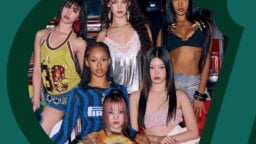In some ways, boutique independent labels have it tough in today’s industry.
With 100,000 tracks uploaded to streaming services daily, cutting through the noise with niche music, that often fits best in an albums market, rather than the singles-focused world of 2022, is arguably incredibly difficult.
At the same time, short-form content that powers platforms like TikTok isn’t always the best opportunity for deep engagement with an artist that might be the antithesis of a one-hit-wonder.
Despite some of the realities for niche indie-released music, the founders of New York-based indie label Mom + Pop remain optimistic.
Rather than harking back to an era gone by, when the music discovery process required more investment, Michael Goldstone and Thaddeus Rudd wholly accept the world they are currently operating within.
“There are platforms out there, exposing music to so many people, across all genres and all ages, in a different form to what we might have ever expected,” says Goldstone.
“To have that much music being put out there is a positive and I think it’s incumbent on us, as hopefully barometers of making good choices in terms of finding artistry, to use those billions and billions of impressions to lead us to talent that we might never find had a platform like TikTok never existed.”
“it’s incumbent on us to use those billions and billions of impressions to lead us to talent that we might never find had a platform like TikTok never existed.”
michael goldstone
Rudd adds: “For our industry to have gone through the complete transformation to streaming while the film business and the book business are still grappling with it, is a monumental achievement.
“We’re all in the position to now operate in a mature music market, where we’re not trying to sell things once and we’re not competing for physical space or reliant on physical supply chains.
“It’s unshackled us to compete and it’s also unshackled artists to be heard. I can’t help but be excited by a streaming market that continues to grow and develop and to have social networks that are fundamentally engaged in using the music that we and others create.”
That said, both Goldstone and Rudd are realistic about the challenge of developing long-term careers off the back of short-term viral success… but more on that later.
Today, Mom + Pop’s roster includes acts such as Courtney Barnett and Beach Bunny, as well as new signings Tegan and Sara, plus LA artist and producer Seb, singer/songwriter Ashe, folk band Caamp, and more.
After ending a long-running distribution deal with Sony RED in 2017, the label, which also has a base in Los Angeles, is now self-distributed to all major DSPs and relies on FUGA for its digital supply chain.
It has direct relationships with some DSPs, including Apple and Amazon, and is a member of indie group Merlin for the rest of the market.
Mom + Pop’s 20+ full-time team members cover areas including radio, touring, international strategy, promotion and streaming. US commercial radio is supported by Further Music — a JV co-owned by Mom + Pop and ex-Sony RED execs Brent Battles and Chris Brown.
International marketing is boosted with the help of London-based DreamTeam, alongside a network of independent press reps worldwide.
The label was founded in 2008 by Goldstone after a storied history in A&R, signing the likes of Pearl Jam, Rage Against the Machine, All American Rejects and Regina Spektor at labels including MCA, Polygram (now Universal), Epic Records and Sire.
At that time, Goldstone had grown frustrated with major labels’ focus on 360 deals. “The artists I gravitated towards were much more independent-minded and probably not suited to those constraints and structures,” he says.
Rather than trying to change the system from the inside, Goldstone says that he set out to start a label that was driven by creative control, artists with strong identities and a 50/50 contractual partnership.
Rudd joined at the end of 2009 after running a management business and working in radio promotion, motivated by Goldstone’s vision.
Initial backing from the company came from Q Prime founders Peter Mensch and Cliff Burnstein (who are no longer part of the business). Early signings Metric, Andrew Bird, Ingrid Michaelson, and, in particular, Sleigh Bells, helped provide the groundwork for Mom + Pop’s reputation.
Goldstone remembers: “The first proof of concept was Sleigh Bells, in terms of being able to find something so culturally important, fresh and musically dynamic and build the identity and audience of that artist in ways that people could look at and define what we were aspiring to do.”
Recent releases from Mom + Pop have included Tegan and Sara’s tenth album, music from actress turned singer/songwriter Maya Hawke, dance act Porter Robinson, and albums from Ashe, Caamp and French artist/producer FKJ.
Here, we chat to Goldstone and Rudd about the development of the label and the challenges that come with working in the independent market today.
What are your standout memories from the early days of starting Mom + Pop?
Thaddeus Rudd: My memories are that it was incredibly challenging. The music business in 2008/2009 was a very different place to where we find ourselves right now. There were many barriers to being successful on the record side and the artist side.
Michael Goldstone: The challenges at that time were to build a level of trust within the artist community. It’s easy to point to the things that you had done within a major label system but it’s also challenging sometimes to articulate what it is that you intend to do. You’re always much better off to have people point to and look at what you do. Starting the label required like-minded people who were striving to find the same thing; a space that could give a level of empowerment to support artists and creative control.
So the business challenges at that point were to get people to take chances. Those managers and artists [who did] in the early days became the architects to help us get to a point where people could see what we were doing. Those first few years were about trying to find the right kind of people with the right approach, working with smaller teams and being able to build a little bit more methodically and intentionally.
Fast forward to today and it seems like the independent sector is doing very well. Is it easier to be an independent artist today than it was when you started out?
Goldstone: I believe that it is. If you look at the significant changes that have happened over the past 12/15 years, there is such opportunity for artists to be able to self-release where historically it required a lot of levers to be pulled. Going way back, it was very difficult for artists to release music without having label partners.
We live in a time now where so much of what gets started are self-releases and artists that have the ability to not wait for labels. It’s a great time for independent artists because there are so many different ways for music to be put into the world and then start to build audience, identity and consumption.
Rudd: That said, there’s certainly a place for a label team going into 2023. There are a whole host of things that companies like us do that are required to build careers to a different level. At the same time, that partnership isn’t required to just bring a record or an EP to market, and that’s a wonderful thing. The role that we play as a label partner has probably changed and evolved two, three, four times over the course of our existence in terms of what our artists and managers expect from us. But at the core, it’s a partnership.
“When we started, the concept of the 50/50 deal and a royalty deal where you would actually recoup your advance was laughable.”
thaddeus rudd
When we started, the concept of the 50/50 deal and a royalty deal where you would actually recoup your advance was laughable or at least it wasn’t frequent. The advances were key and the expectation that you would actually recoup was not common. Now, certainly with us, our artists are in profits and they’re enjoying long, important partnerships and streams and all that. We’ve evolved to a place where it’s a much more transparent and a much more successful business generally, but those fundamental precepts are still in place.
What do artists and managers expect from a label partner today?
Rudd: There’s been a sea change in terms of what the expectations are from a label partner. When we started, one time we had to hire an old cohort of Goldie’s [Goldstone] to be our big box retail consultant, to help our distributor and make sure that we had endcaps in Best Buys and Targets. The actual push to get product in the market was so difficult, before we even had to make the sale. Thankfully, those days evolved into a much more intuitive ecosystem.
But to get to where we are now, we transitioned from being part of a larger system — we had seven or eight successful years with Sony Red as our distributor and service provider — into a self-sufficient, almost end-to-end control system where we don’t require a distributor in North America or an aggregator or license partner in the UK and Europe.
The current version of Mom + Pop probably sits somewhere between a major, in terms of the services that we scaled to, and an aggregator in terms of the controls and the transparencies that we seek to deliver to our artists and managers. It leaves us in a place where we do feel like we’re partners globally.
“a lot of people will speak to creative controls but I think there are many challenges within different systems to really embrace a finished record.”
Michael Goldstone
Goldstone: The other aspect, which is so important, are those creative controls that became the impetus for starting the label, and being in a situation where you have a true understanding of what that really means. There are artists who will deliver finished, mastered records and we inject all the energy necessary and all the economics and support.
There are artists that, over time, may require a certain level of recommendations, facilitating producers or wanting to have a reference point. But at the end of the day, for us, it is imperative for those artists to be able to make those records without interference and deliver them in the way that they envision them.
It’s something that I’ve always taken pride in and not always been in the position to execute. Having been in different systems along the way, a lot of people will speak to creative controls but I think there are many more challenges within those different systems to really embrace a finished record. That’s something that I think has also helped us build a reputation within the artist community.
What’s been your toughest moment across Mom + Pop’s evolution?
Goldstone: In some ways, you can look at where things are right now in terms of working around virality. We strive really hard to embrace every platform along the way because historically, there has been resistance to new ways for music to be discovered.
As we look at the landscape right now, it’s our responsibility, and challenge, to look within a system that’s being driven by a lot of virality. The greatest challenge is to find the artistry underneath the viral song or the viral moment, as opposed to taking a negative or cynical view about artists that are unveiling themselves on these platforms.
Rudd: We’re in the career business and when you have a song that becomes very big, we remember that our job is to do everything right now and to lean into the opportunity but to also ensure that there’s an audience and a career for the song, the EP, and the album coming after that, and have a long term plan. The terminology that we use here is that we’re going to think fast and slow at the same time — we’re going to do what needs to be done to break the record and seize the opportunity, but build the base and build the long term.
“there’s a vast difference between the heights that the viral songs are scaling to and the floor of what that next song is probably going to do. our goal is to build a career out of it.”
Thaddeus Rudd
What we’re seeing as a business right now is that there’s a vast difference between the heights that the viral songs are scaling to in terms of consumption and the floor of what that next song by the artist is probably going to do. Our goal is to build a career out of it. We’re not a company that will go song to song or viral moment to viral moment as a matter of strategy.
How do you cut through the level of noise that’s out there?
Rudd: Firstly, our label strategy has been to release a small number of records and do a higher level of work with artists. And we’ve tried to partner with artists with clear identities who are unique and special. So we hope that the artists by themselves are worthy of attention.
Goldstone: By being judicious and thoughtful about the number of releases, it puts us in a position with gatekeepers where we’ve been fairly consistent throughout the years. We are not walking in week after week saying, ‘This is the most important artist, here’s what they’ve done and here’s why you should engage’. I think that’s helped us along the way in terms of PR, radio and the DSPS.
“We are not walking in week after week saying, ‘This is the most important artist, here’s what they’ve done and here’s why you should engage’.”
Michael Goldstone
Also, some of what we learned in the early days with Flume has now continued with Caamp, Ashe and Beach Bunny. By the time we went to radio with Flume, we were in a position where there was a significant audience, which helped us achieve success within those formats. For us, the radio component becomes the exclamation point on a campaign.
When we worked Flume at radio, the audience for those stations was already consuming his music, which made it much more relevant and impactful for the stations to support him. Had we walked those songs in on day one without that audience, they would not have had much of a chance to succeed. We continue that strategy with a band like Caamp, which has built a significant touring profile and put us in a position to further it with some of those conventional levers.
What’s your proudest achievement across Mom + Pop’s evolution?
Goldstone: Our sustainability and longevity is something that I’m extremely proud of in these times. We started very modestly and to now be in a position where we feel like we have something different to offer than majors and yet in many ways are more than able to compete, is extremely satisfying. Having started in a very methodical and conservative way, it’s something that we deeply value.
Rudd: This label was started with Goldie, an assistant fresh out of college, an A&R person and me as a consultant. It started small and grew as the artists grew. We have a reach outside of our home territory, we have a staff that are incredibly passionate and supportive of our label and vision and supportive of our artist’s vision in a way that transcends any personal ethos from myself or Goldie. Thirteen years later, that feels like an amazing achievement.
The artist roster grew from one, two, three or four to a track record we’re both proud of musically and also in terms of careers for the artists that are with us and those we’ve worked with over the years.
What would you change about the music industry and why?
Goldstone: The potential manipulations of these viral systems. We’re always hoping for as much transparency and equality as possible, especially as a smaller entity, you’re always hoping to remain in a competitive position.
Like Thad was speaking to earlier, historically, we had to compete to get music in stores. That business is now open and [I hope] it continues to stay as equal as possible and the right music and artistry is able to break through. We’re always hoping that things become driven by the artistry as much as possible and not by people being in a position to regulate or manipulate what gets through and what gets exposed.
“We’re always hoping that things become driven by artistry and not by people being in a position to regulate or manipulate what gets through.”
Michael Goldstone
Rudd: One of the things we’ve appreciated at Mom + Pop is that we have the power to change how we do things. At the same time, we’re not in a position to control the broader music industry forces and we’re fortunate that we have Merlin looking out for our deals and rights on the commercial side. But who we hire, how we develop staff, how we work together internally, certainly the artists and the work that we do on campaigns — all those things are controllable.
Our ability to negotiate what we’re all dealing with, the positives and negatives, has become our challenge and our opportunity. Being nimble over the last X number of years, as we’ve evolved into being what we are now, has allowed us to change in the ways that we wanted to change, internally, as a small company, and externally in terms of how we affect the market with our music.
Final question: what are your ambitions for the next chapter in Mom + Pop’s history?
Goldstone: To stay current and relevant with the changes that are happening in order to ensure our own sustainability. We’ve grown up with so many incredible brands to be inspired by, whether it’s people within the Beggars Group or the Sub Pops of the world.
We’ve looked at their longevity and for us, we’ll try to make whatever decisions we can to maintain that level of independence and empowerment of artists and strive to hopefully be one of those labels that people can look back on reverentially.
Rudd: How we are next year is going to be a function of who we’re working with and what those needs are. We tend to question how we’re doing, what we’re doing and ask ourselves, ‘Are there things that we ought to be thinking about, considering and evolving into?’
It may not be growth as much as evolution, it’s not linear, but it’s certainly an openness to think about and embrace the future and be mindful in the process. We have a healthy degree of expectation from each other and ourselves to be the best version of what we are.
Music Business Worldwide





